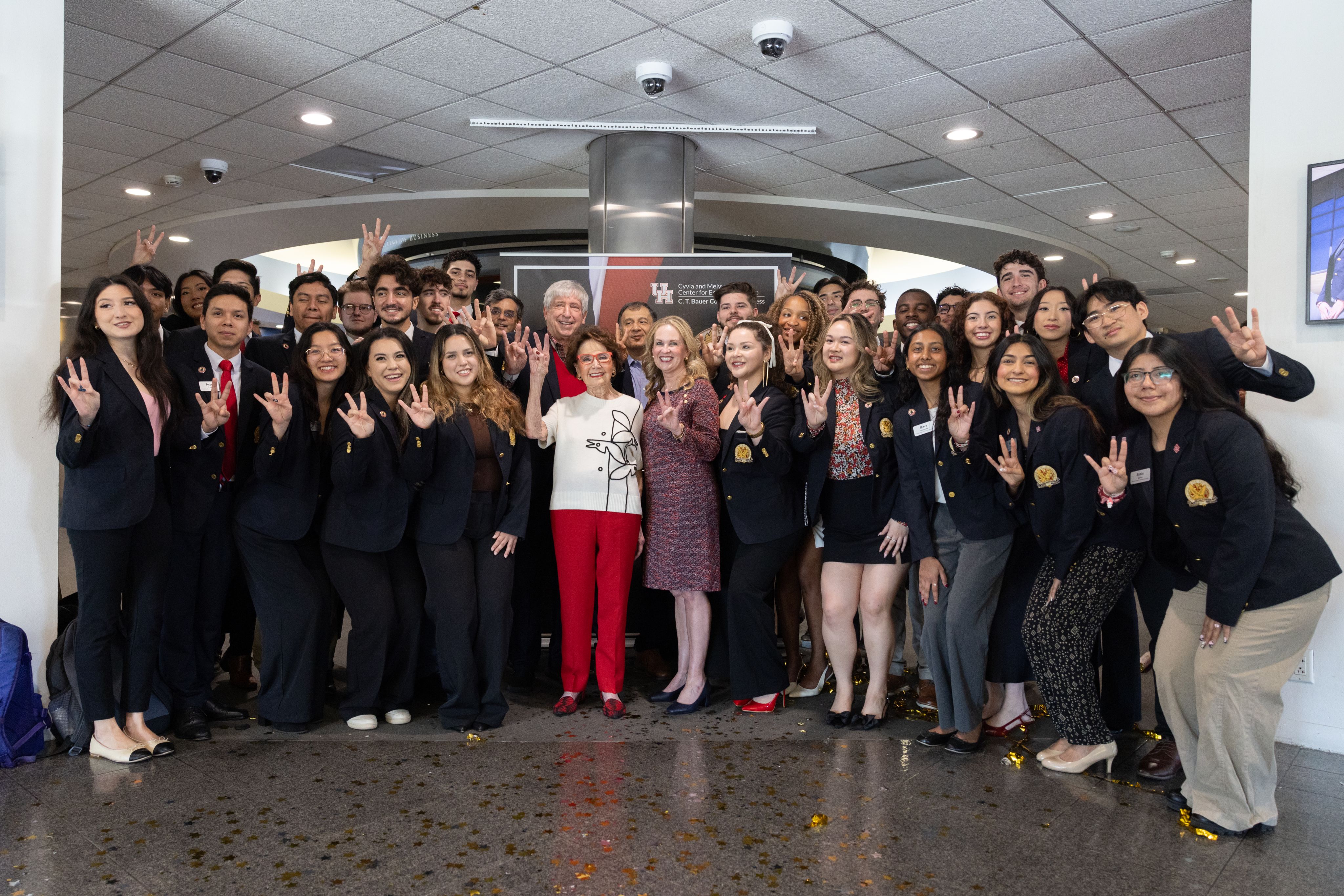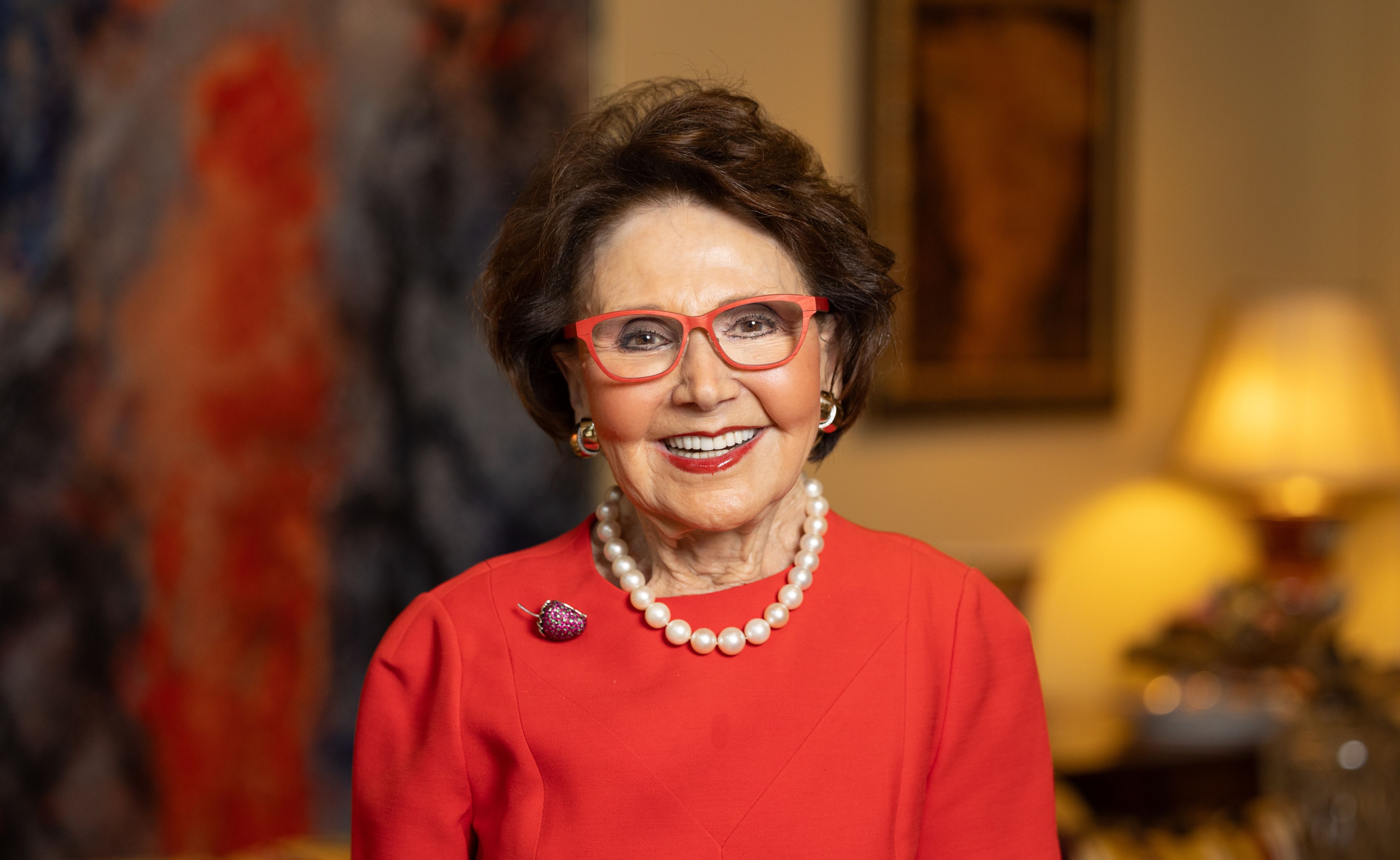The Gift Who Keeps on Giving
How the Wolff Family’s Investment in the Wolff Center for Entrepreneurship Pushed the Program to National Recognition

The Wolff name maintains legacy that runs deep within the University of Houston.
Not only does the Wolff name brandish the C. T. Bauer College of Business’ entrepreneurial program, the Wolff Center for Entrepreneurship, it also carries a prestige recognized across the Bayou City as well as the country.
The program’s latest honor came when it was named the No. 1 undergraduate program for entrepreneurs in the country by The Princeton Review for the sixth year in a row. It is the program’s ninth time to take the top spot in the past 18 years. It’s an honor the program’s namesake, Cyvia Wolff, said is extraordinary.
“I am so proud of how the Wolff Center for Entrepreneurship has grown and how it’s learned from its mistakes,” she said. “It’s just gotten better and better and better.”
“I am so proud of how the Wolff Center for Entrepreneurship has grown and how it’s learned from its mistakes,” she said. “It’s just gotten better and better and better.”
Cyvia Wolff

Cyvia Wolff and her late husband Melvyn Wolff, who died in 2017, made numerous donations to the Bauer College over the years. It’s why Melvyn Wolff’s alma mater ultimately named the program after the couple in 2008.
Prior to his death, Melvyn Wolff was a respected businessman who built up Houston-based Star Furniture before selling it to Warren Buffett in 1997. Melvyn Wolff took on the role of chairman following the sale.
In the years since his death, Cyvia Wolff, who serves as a board member for the Bauer College of Business Foundation, has continued the Wolff family’s legacy of generosity, making significant donations to the Wolff Center as well as other organizations across the city, such as the Memorial Park Conservancy, MD Anderson and the Museum of Fine Arts Houston.
“We have to give back to our community; that’s who fed us,” Cyvia Wolff said. “Many people bought furniture from our business. If I don’t give back, who am I? And it’s not mine to keep anyway; it’s mine to give away.”
Cyvia Wolff sat down with the University of Houston to talk about what the Wolff Center for Entrepreneurship’s legacy means to her.
Q&A with Cyvia Wolff
Q: The Wolff Center has been ranked the No. 1 undergraduate program for entrepreneurs around the country multiple times. How does it feel?
A: I think it’s extraordinary. The entrepreneur program is spanning the whole campus. It’s not just in the entrepreneur school – it’s going to all the schools because, I don’t care what you do, you need to know how to be an entrepreneur.
Q: Why is that important to you?
A: Well, first of all, just knowing how your finances work and how to sell yourself. You know you’re important and you know this is something you want to do, but how do you get people to appreciate it? It’s important to know how to do that.
Q: The program was first named in 2008; did you image it would be where it is now?
A: I really didn’t know that I thought about it. But I am so proud of how it has grown and how they’ve learned from their mistakes. They’ve just gotten better and better and better. I feel fortunate because the University of Houston really takes care of our city. I have so many friends who say, “You know, I have some of your students working in my office and they’re the best ones I have. They’re the hungriest.” It’s really very exciting.
Q: What do you attribute to the Center’s success?
A: What they do with Wolffest is amazing. Those students really have to learn a business. They have to buy property on the UH campus, they have to go out and raise money and give money to scholarships in the entrepreneur program. It’s very exciting to watch it grow.
Q: What does the legacy of students giving back mean to you and how does it set the program apart?
A: For me, one of the things I ask all students at graduation or at my house: Please remember what you learned from this university and come back and give. Without you, the program and university won’t grow. Remember where you came from.
Q: What are student dinners like for you?
A: I love them. I get to learn about all the history of the students. For a period, a lot of them only wanted to start nonprofits. We have a little less of that, but a lot of them have their eyes on doing good things for other people. That’s very special.
Cyvia Wolff in her Galleria-area home.
Cyvia Wolff in her Galleria-area home.
Cyvia Wolff celebrates the Wolff Center for Entrepreneurship's latest honor.
Cyvia Wolff celebrates the Wolff Center for Entrepreneurship's latest honor.
Students and staff celebrate the Wolff Center for Entrepreneurship taking the top spot on The Princeton Review’s ranking of Top Schools for Entrepreneurship for the sixth year in a row.
Students and staff celebrate the Wolff Center for Entrepreneurship taking the top spot on The Princeton Review’s ranking of Top Schools for Entrepreneurship for the sixth year in a row.
Students wander around Wolffest 2024.
Students wander around Wolffest 2024.
Cyvia Wolff signs a monetary gift to University of Houston President Renu Khator.
Cyvia Wolff signs a monetary gift to University of Houston President Renu Khator.
Q: What is the Wolff Center’s role in the community?
A: The whole city is aware of the Wolff Center. We advertise; we’re on PBS all the time. I think our community is aware of it, in addition to having students come and work at a lot of Houston companies. We have a lot to be proud of.
I’ve brought people to Wolffest and they’re always impressed. And we have so many mentors; we have 600-and-some-odd members. Where else do you get something like that? That’s incredible.
Q: What excites you most about Wolffest?
A: The energy these kids have to put into it. It’s a big part of their grade. They have to learn how to use the credit card and get the credit card company to let them do the business, and they have to learn how to collect money and raise funds. The students learn how to work together. This is a business they’re running. That’s what excites me most.
Q: Houston is a big hub for innovation; how does the Wolff Center contribute to the city’s entrepreneurial ecosystem in the coming years?
A: Well, hopefully they’re going to do a lot. They’ve been working doing something with plastics; they’ve been working on water; they’ve been improving how we do cement for our roads. I think in many ways, these students will continue to be creative and do more for our city.
Q: How does it feel to be tied so closely to the Wolff Center?
A: I’m very excited to be a part of this. You can give money to something and they thank you, but in this case, Dave Cook sends me a list of events to attend at the University of Houston. I get to be part of this gift. That’s what’s exciting to me.
Q: What can Bauer and the Wolff Center do to help the University of Houston?
A: Maybe we can train our students to be more vocal about how proud they are and what UH does. I don’t know what they can do; I’m not in advertising. But we need to do something more to show how wonderful we are.
What Renu Khator has done with this University in the time she’s been here is nothing short of a miracle to me. We have the medical school, we’re in the Big 12 – I think we need to speak up more about ourselves.
Because every year, we’re getting bigger and better.






